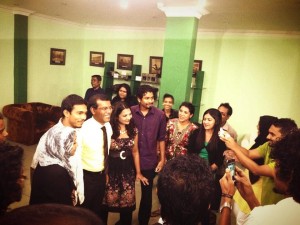The Elections Commission (EC) has dismissed fears foreign nationals will have access to the country’s voter database for upcoming polling, as it seeks assistance from Indian IT professionals to set up software to help oversee future council elections.
EC President Fuwad Thowfeek said he had met this week met with a “combined team” representing the government-aligned Progressive Party of Maldives (PPM) and Jumhoree Party (JP) to dismissed their fears that foreign IT workers would be given access to information related to next month’s scheduled election.
“We explained to them that the Indian team would not be working on systems being used for the upcoming presidential election. They will instead be providing assistance to help develop a program for future elections,” he said.
Local media reported today that the PPM and JP had challenged the possibility of holding free and fair elections scheduled for September 7 this year if foreigners could access the electoral database and other systems.
However the EC has moved to dismiss any fears, adding that it only local EC staff had access to sensitive information and the commission’s security systems.
Despite having initially sought local IT professionals for the project, Thowfeek said it had not been possible to find Maldivians with either the programming skills required for the project, or those willing to work within the budget assigned for the project.
“Firms presently operating in Male’ demanded much higher rates to oversee the project,” he added.
Thowfeek said he was surprised by the concerns of the government-aligned parties, given the large number of state bodies and institutions dependent on foreign expertise and assistance.
“This would not be the first time the EC or the government has accepted assistance from friendly nations. For instance the defence ministry has been getting assistance from the US, while police are given a wide variety of training from numerous international bodies,” he said.
“There is no reason why political parties should be worried [about foreign nationals being given access to EC data]. We are fully committed to free elections and remain answerable to the parliament. We will oversee this election with caution and confidence.”
The government is presently considering introducing a border control system provided free of charge by the US government, after this week terminating a contract signed in 2010 with Malaysia-based IT group Nexbis to install similar technology.
Thowfeek added that the EC had traditionally enjoyed a close relationship with its Indian counterpart, particularly for training of its staff abroad on overseeing electoral processes. He said a total of 20 Maldivian staff had received training last year relating to good practice in overseeing voting.
Both the Indian Elections Commission, as well as observers from several EU and Commonwealth nations will be coming to the Maldives to oversee next month’s vote.
“Complex” council elections
According to Thowfeek, the Indian programmers brought over to the Maldives to work with the EC had been hired specifically to develop a computerised system to help monitor future atoll and island council elections.
He said that with some 190 separate island constituencies, two city councils and 20 individual atoll councils, previous voting had presented complex challenges for the EC to overcome – despite the polls seen as credible by observers and local parties.
Based on the EC’s experience of overseeing the last council elections in February 2011, Thowfeek said it would be preferable to commence work on a computer system that could identify the exact number of ballot papers for each specific constituency around the Maldives.
“There are over 200 ballot papers required during a council election, so we are looking for a system that can send the appropriate data [to these islands],” he said.
The proposed system is expected to allow registered Maldives nationals to vote for the council of their respective home island from anywhere in the country, without the need to return to that particular constituency to vote.”
Party concerns
The EC has sought to reassure concerns from assorted political parties this week over the credibility of the upcoming polls.
On Monday (August 5), the EC rejected any possibility that the identities of deceased citizens could be used to fraudulently vote in the upcoming election, after opposition allegations that security forces were seeking to influence polling by misusing such data.
The Maldivian Democratic Party (MDP) has continued to accuse both the government and senior police officials of trying to undermine free and fair elections, accusing police of actively seeking deceased lists detailing the country’s deceased in an attempts to try and rig voting.
Police later rejected the allegations, with the EC stating that it would not be possible to vote using details of the deceased.
Meanwhile late last month the EC rejected calls by the PPM to make voter registration more “lenient”, with Thowfeek claiming efforts were being stepped up to prevent voter registry fraud, while also dealing with challenges that arose during the country’s first multi-party election in 2008.
“We have worked to rectify these mistakes and in the last council elections there were hardly any complaints raised with us by political parties,” he said at the time. “More than that, we have worked hard this year to get the registry up to date.”
 PPM’s former interim Vice President, who lost the party’s presidential primaries to PPM Leader Maumoon Abdul Gayyoom’s half-brother Abdulla Yameen spoke at the JP coalition’s rally tonight, criticising the presidential candidates of both PPM and MDP.
PPM’s former interim Vice President, who lost the party’s presidential primaries to PPM Leader Maumoon Abdul Gayyoom’s half-brother Abdulla Yameen spoke at the JP coalition’s rally tonight, criticising the presidential candidates of both PPM and MDP.
 MP Shifaq Mufeed, who initially was in MDP and later defected to PPM in 2012, also joined the JP coalition.
MP Shifaq Mufeed, who initially was in MDP and later defected to PPM in 2012, also joined the JP coalition.